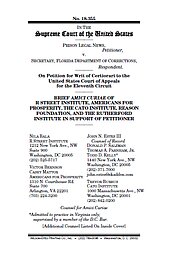Learn more about Cato’s Amicus Briefs Program.
Prison Legal News is a monthly magazine that reports on legal developments in the criminal justice system and reaches 7,000 thousand subscribers including almost 5,000 incarcerated subscribers across all fifty states. The monthly publication includes writings from legal scholars, attorneys, inmates, and news wire services that teach prisoners how to advocate for their rights, how to better rehabilitate, and how to ensure transparency and increase accountability of prison officials. The magazine also includes advertisements for pen-pal solicitation, cash-for-stamps exchange services, and three-way calling services. Believing that the ads could enable inmates to violate rules and commit crimes while still incarcerated, the Florida Department of Corrections banned the magazine.
Prison Legal News brought a First Amendment challenge to the ban. Although the department of corrections had little evidence that the magazine was disruptive, the Eleventh Circuit upheld the ban by giving almost complete deference to prison administrators’ assertions. Cato, the R Street Institute, the Reason Foundation, Americans for Prosperity, and the Rutherford Institute have filed an amicus brief supporting the magazine’s petition to the Supreme Court, which is being led by Supreme Court superlawyer and former solicitor general Paul Clement. We argue that the Constitution requires careful judicial scrutiny of government actions that extinguish First Amendment rights, including the actions of prison administrators. While imprisonment inevitably requires some limitations on liberty, those limitations must be reasonably related to legitimate penological interests. The mere invocation of “prison security” is not a trump card that can be used by officials to silence those with whom they disagree. Here, the department of corrections failed to sufficiently justify its censorship, which amounts to an impermissible effort to imprison not only the body but also the mind. We also argue that over-criminalization and mass incarceration place an extreme economic burden on society, and therefore preventing of recidivism should be one of the primary objectives of imprisonment. Prison Legal News helps reduce recidivism by changing prisoners’ attitudes about the legal system and imparting knowledge and skills to become productive citizens upon their release. While prisons are unique institutions, they’re not so unique that the First Amendment doesn’t apply to the decisions of prison administrators. Unquestioning deference to governmental officials who impinge upon the freedom of the press is incompatible with the Founder’s vision of the Judiciary as the “guardian” of the Bill of Rights.
